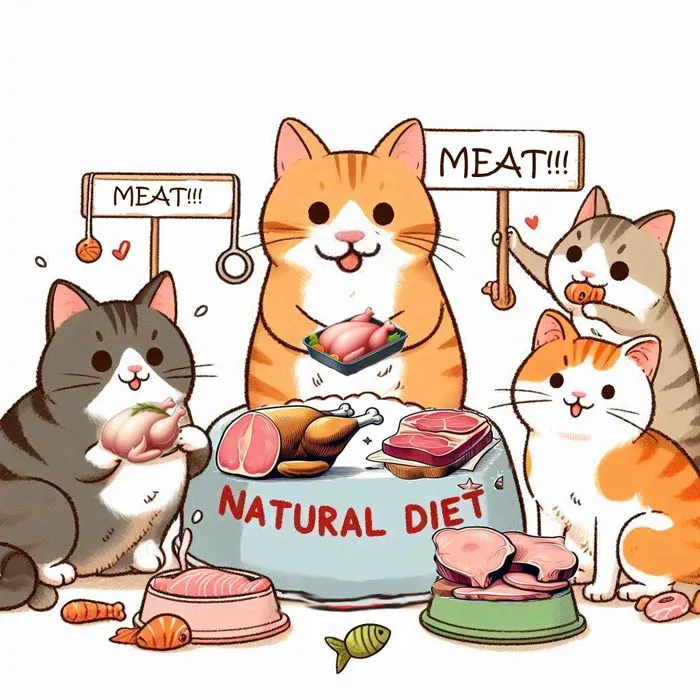Natural Diet for Cats

Don't forget to leave your warm and funny comments at the bottom of the page!
Key Components of a Natural Diet
Cats are obligate carnivores, meaning their natural diet consists primarily of meat. They require specific nutrients found in animal-based proteins to thrive.
Here's an overview of a natural diet for cats.

The well-known formula for a natural cat diet is 80:10:10
- 80% Meat: This includes muscle meat from sources like chicken, beef, rabbit, or turkey. It provides the primary protein and essential amino acids cats need for their health.
- 10% Bones: Raw, meaty bones supply calcium and other vital minerals for strong teeth and bones. Examples include chicken wings or necks.
- 10% Organ Meats: This includes nutrient-rich organs like liver and kidneys, offering a natural source of vitamins and minerals, such as vitamin A, B vitamins, iron, and zinc.
Half of this (5%) should be liver, which is rich in vitamins A and D. The remaining 5% should include other secreting organs such as kidneys, spleen, or pancreas.
Note: Too much liver can cause vitamin A toxicity.
Optional Additions
- Eggs: A nutrient-rich supplement for protein and biotin.
- Fish (in moderation): Cooked mackerel or sardines provide Omega-3 fatty acids and vitamin D, but limit to 1–2 servings a week to avoid overexposure to heavy metals.
Note: Raw fish is not recommended for cats. Always ensure the fish is boneless, plain (no added oils, salt, or seasonings), and served in moderation.
When balanced correctly, the 80:10:10 ratio ensures your cat receives all the nutrients required for optimal health, mimicking their natural prey diet in the wild.
For detailed nutrient profiles and dietary recommendations, you can review the AAFCO's cat nutrient requirements in full:
AAFCO's cat nutrient requirements

Key Components of a Natural Diet
High-Quality Animal Protein
Sources: Chicken, turkey, beef, lamb, fish (cooked mackerel or sardines), rabbit, or duck.
Importance: Provides essential amino acids, like taurine, which is critical for heart and eye health.
Healthy Fats
Sources: Fat from meats, fish oils, or supplements like salmon oil.
Importance: Supplies energy, aids in skin and coat health, and supports brain function.
Minimal Carbohydrates
Cats don't require grains or starches like potatoes, peas, or corn. These can lead to weight gain, diabetes, or digestive upset if fed in excess.
Some high-quality cat foods include small amounts of carbs (like rice or pumpkin) for binding or fiber, but they should remain minimal.
Secreting Organs
Liver: Rich in vitamins A, D, E, K, and essential minerals. Should be fed in moderation (5–10% of the diet) to avoid vitamin A toxicity.
Kidneys: A good source of B vitamins, iron, and selenium.
Note: The heart, being a non-secreting organ, is a muscle and is classified as muscle meat in a raw diet. It is an excellent source of taurine.
Bone or Calcium Supplementation
Sources: Raw meaty bones (e.g., chicken wings or necks) or powdered calcium.
Importance: Essential for strong bones and teeth.
Water
Cats naturally get much of their hydration from their food, so wet or raw diets are preferable over dry food.

Benefits of a Natural Diet
- Improved coat health and reduced shedding.
- Better digestion and fewer hairballs.
- Increased energy levels.
- Healthier weight and muscle tone.

Foods to Avoid
- Onions, garlic, and chives.
- Grapes & Raisins
- Chocolate, caffeine, and alcohol.
- Raw dough or anything with yeast.
- Cooked bones (they can splinter).
- Dairy (many cats are lactose intolerant)
- Dog Food
Foods Your Cat Should Never Eat
If Your Cat Eats Something Harmful
Keep these emergency numbers accessible: your vet, the nearest pet emergency clinic, and the ASPCA Animal Poison Control Center at (888) 426-4435.

Considerations
- Balance is Key: A natural diet must meet your cat's nutritional requirements. Consulting a vet or pet nutritionist is essential.
- Transition Gradually: Switching to a natural diet should be done slowly to avoid digestive upset.
- Store Safely: Handle and store raw food properly to prevent bacterial contamination.
A natural diet tailored to your cat's needs can help them live a longer, healthier life!
